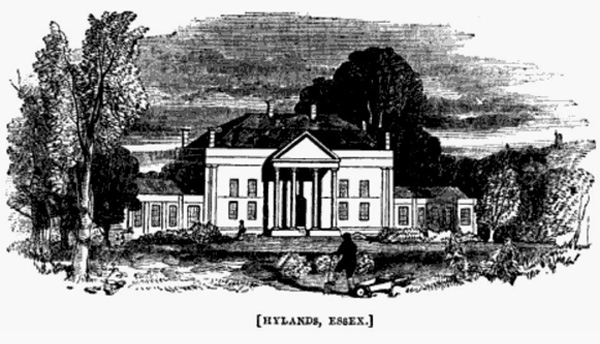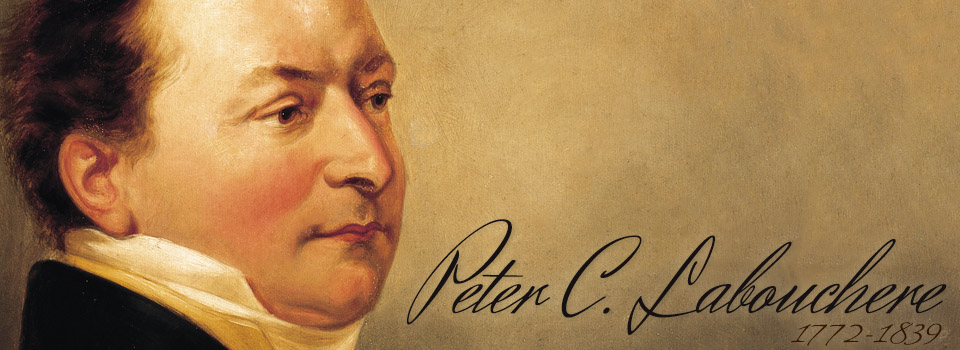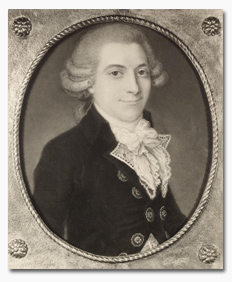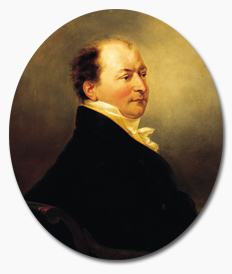Peter Caesar Labouchere (1772 - 1839)
Peter was the first child and son of Matthieu de Labouchere and Marie-Madeleine Moliere.
("The Life of Henry Labouchere" by Algar Thorold, 1913, page 1-2):
Among the cloth merchants of Orthez none were more distinguished than the Laboucheres. According to the Freres Haag, the compiles of La France Protestante, their name should be Barrier de Labouchere, the patronymic which they came to adopt being in reality the name of a property in the possession of the family. The earliest known ancestor of the Laboucheres seems to have been a certain Jean Guyon Barrier, who married in 1621 one Catherine de la Broue.
Pierre-Cesar, the founder of the British branch of the family and the grandfather of the subject of this memoir, was born at The Hague in 1772. He was the second son of Matthieu Labouchere and Marie-Madeleine Moliere. His father, who, in consequence of the revocation of the Edict of Nantes, had been sent to England for his education, had subsequently settled in Holland. Pierre-Cesar was sent at the age of thirteen to learn his uncle Pierre's business at Nantes, where he remained until 1790, at which date he entered the house of Hope at Amsterdam as French clerk. In this humble position he laid the foundations of the great fortune and financial career which were to be his. The rise of the young French clerk was rapid. In six years he was a parner in the house of Hope and had married Dorothy, sister of Alexander Baring, who had become a partner in the Dutch firm at the same time as his French brother-in-law. The well-known story of the clever ruse by which Pierre-Cesar won the hand of his bride and also his partnership in the house of Hope was told to the present writer some twenty years ago by the Rev. Alexander Baring as follows*:
Pierre-Cesar was sent by Mr. John Hope to England to see Sir Frances Baring on some business, and fell in love with Sir Francis's third daughter Dorothy. Before leaving England he asked Sir Francis to permit him to become engaged to his daughter. Sir Francis refused. Pierre-Cesar then said: "Would it make any difference to your decision if you knew that Mr. Hope was about to take me into partnership?" Sir Francis unhesitatingly admitted that it would. Pierre-Cesar then went back to Holland and suggested to Mr. Hope that he might be taken into partnership. On Mr. Hope discouraging the idea, he said: "Would it make any difference to your decision if you knew that I was engaged to the daughter of Sir Francis Baring?" Mr. Hope replied, "Certainly." Whereupon the wily clerk said: "Well, I am engaged to Miss Dorothy Baring." That very day he was able to write to Sir Francis announcing the news of his admission to partnership in the house of Hope, and in the same letter he claimed the hand of his bride.
The following pictures of Pierre-Cesar by a contemporary is interesting. The writer was Vincent Nolte, for many years a clerk in the house of Hope at Amsterdam. "Mr. Labouchere was at that time but twenty-two, yet ere long assumed the highly respectable position of head of the firm, the first in the world, and studied the manners of a French courtier previous to the Revolution: These he soon made so thoroughly his own, that they seemed to be a part of his own nature. He made a point of distinguishing himself in everything he undertook by a certain perfection, and carried this feeling so far that, on account of the untractable lack of elasticity of his body and a wont of ear for music which nature had denied him, he for eighteen years deemed it necessary to take dancing-lessons, because he saw that others surpassed him in the graceful accomplishment. It was almost painful to see him dance. The old school required, in the French quadrille, some entrechats and one or two pirouettes, and the delay they occasioned him always threw him out of time. I have often seen the old gentleman, already more than fifty, return from a quadrille covered with perspiration. Properly speaking, he had no refined education, understood but very little of the fine arts, and, notwithstanding his shrewdness and quickness of perception, possessed no natural powers of wit, and consequently was all the more eager to steal the humour of other people. He once repeated to myself as a witty remark of his own to one of his clerks, the celebrated answer of De Sartines, a former chief of the French police, to one of his subordinates who asked for an increase of pay in the following words: 'You do not give me enough – still I must live!' The reply he got was 'I do not perceive the necessity of that!' Now, so hard-hearted a response was altogether foreign to Mr. Labouchere's disposition, as he was a man of most excellent and generous feeling. He had, assuredly, without intention, fallen into the singular habit of speaking his mother-tongue - the French - with an almost English intonation, and English with a strong French accent. But he was most of all remarkable for the chivalric idea of honour in mercantile transactions, which he constantly evinced, and which I never, during my whole life, met with elsewhere, in the same degree, however numerous may have been the high-minded and honourable merchants with whom I have been thrown in contact. He fully possessed what the French call 'des idees chvaleresques'."
In 1800 Pierre-Cesar reestablished himself for a time in England, whither Hope's had been temporarily transferred after the invasion of Holland by Pichegru.
. . . When in 1817 France was beginning the task of reconstruction, the principal difficulty in the way of the ministers of Louis XVIII. was the very serious financial situation. . . .It was necessary to have recourse to credit. But how to obtain a loan? France was not in a state which could inspire financiers with much confidence. In these circumstances Messrs. Labouchere and Baring once more placed themselves at the service of the French Government. They purchased nearly twenty-seven million francs' worth of government per cent. rente, and thus restored French credit. Their action was, no doubt, not purely disinterested, as they bought the rente at an average price of 56.50 and obtained an interest of nine per cent. on their money. Still, the difficulty of the moment was to find anybody to do it at any price. A private journal of the period, kept by the husband of a niece of Sir Francis Baring, consequently a first cousin by marriage of Mme. Pierre-Cesar Labouchere, gives the following account of the transaction: "The 'Alliance Loan' of the Barings at Paris in 1816 probably doubles his (Pierre-Cesar's) fortune, and he soon after quitted business, and settled altogether in England, living at Hylands, a property he bought in Essex, and in Hamilton Place, where his home was frequented by many distinguished people and diplomatists."
* The portraits of Pierre-Cesar Labouchere and Dorothy his wife, now in my possession, were then at Farnham Castle, and Mr. Baring was visiting my father, the then Bishop of Winchester, when he related to me this anecdote of my great-grandparents.
("The Huguenots, Their Settlements, Churches & Industries in England and Ireland" by Samuel Smiles, page 373-4):
Labouchere, family of: an ancient Bearnese Protestant family, whose original name was Barrier. In 1621, Jean-Guyon Barrier, notary-royal, married Catherine de la Broue, and from this union sprang Francis, signeur of Labouchere, practitioner of law at Stranniac in the department of Commingues. His son Peter, who was a merchant at Orthez, being a Protestant, sent his son and daughter, Matthew and Susan, to London to be educated by their relative, Dr. Majendie, pastor of the French church in St. Martin's Lane, who was also from Orthez. The children did not return to France. Matthew went over to Holland, where he married and settled. He had several sons, of whom Peter-Caesar established the branch of the family which ultimately settled in England; while Samuel-Peter continued the descent in Holland. The former was born at the Hague in 1772. After undergoing some preliminary training in the office of his uncle Peter at Nantes, he entered the great commercial house of Hope at Amsterdam, in which he became a partner at the age of 22, together with Mr. Alexander Baring, whose sister he married. On the invasion of Holland by Pichegru, in 1793, the head-quarters of the house of Hope were removed to London, where Mr. Labouchere settled in 1799, and superintended the business for many years, conducting many large financial operations. Strange to say, he possessed the confidence in a large degree of Napoleon Bonaparte, who employed him privately in 1810, to sound the British government as to the conditions on which they would agree to a general peace. Mr. Labouchere retired from business in 1821. His eldest son Henry, who took honours at Oxford, sat in the House of Commons for many years, was President fo the Board of Trade and Secretary for Ireland, and has since been raised to the peerage under the title of Baron Taunton. His second son, who married a Miss Dupre, also descended from a Huguenot family, was for a long time one of the principal partners in the London banking house of Williams, Deacon, Labouchere, and Co.
("Phases of Panics: A Brief Historical Review" by Charles Woolley, 1896, page 77):
When the Messrs. Hope retired to England in consequence of the occupation of Holland by the Revolutionary French army, and after Alexander Baring had left the house, he determined to visit the United States of North America, where he married Anna, the eldest daughter of Mr. William Bingham, in Philadelphia, who was at that time considered the richest man in the United States, and was then a member of the Senate. Of the nine children, the eldest, called William Bingham, after his grandfather, is the present Lord Ashburton.
The downfall of Napoleon's Empire in 1814 had presented to the house of Hope & Co., which for five years had been subsisting only for the liquidation of the various State loans undertaken by it, an opportunity of at once resuming all its former importance; but the partners, who were then living in England, manifested but little disposition to do so.
Mr. Alexander Baring, who fully comprehended the magic influence of so illustrious a mercantile name, resolved to buy it out, under the condtion that the old original firm should be maintained.
He overcame the reluctance of his brother-in-law, Mr. P.C. Labouchere, who had been intrusted with the business management of the concern, to undertake it again, and the latter finally consented, expressly stipulating that he should be allowed to select an assistant; the desired aid was found in his friend Mr. Jerome Sillem, who had formerly lived in Hamburg. Mr. Baring reserved for himself a third part in the new house of Hope & Co., and the other two-thirds were divided between the brothers P.C. and S.P. Labouchere, Mr. Jerome Sillem, Mr. Van der Hoop, of the former house of Krusen, at Amsterdam, and Mr. P.F. Lestapis.
Mr. Thomas Baring, one of the present heads of the Baring house at London, also took part in the management of the Hope firm, as did John, the younger son of Mr. P.C. Labouchere.

("Norfolk Chronicle" 3 Dec 1796, page 4):
MARRIED. At the Strand, P.C. Labouchere, Esq. partner with Messrs. Hope, to Miss Baring, third daughter of Sir Francis Baring, Bart.
("The Star" 30 Apr 1812, page 3):
Mr. Labouchere, of the House of Messrs. Hope and Co. of Amsterdam, arrived in Town this morning; he sailed from the Maese on Saturday last. – This is the same Gentleman who came charged with a Mission from the Dutch Government to this Country, during the time of King Louis. Whether his present visit is of a political or commercial nature has not yet transpired.
("Morning Advertiser" 22 Oct 818, page 2):
The Bankers Labouchere and Baring have left that place for Paris, in order to make preparations for the first payment of the contributions, stipulated by the new Treaty to be paid on the 1st of January next.
("Essex Standard" 14 Oct 1836, page 2):
P.C. Labouchere, Esq., father of the Vice-President of the Board of Trade, arrived in Hamilton-place, on Saturday, from a visit to his illustrious and venerable friend Prince Talleyrand, at Valencay. The Chateau was very gay, and more company was expected. The honours of the mansion were done by the Duchess de Dino.

("Memoirs of the Duchesse de Dino: 1831-1835" by Dorothee Dino, page 72):
Hylands, June 2, 1834. — . . . Here at Hylands we are with M. Labouchere, an old and kind friend. The place is very cheerful, and distinguished for its wonderful flowers and vegetables. M. Labouchere, who is a cosmopolitan sort of person, has collected about him many souvenirs of travel, but Holland is the mot conspicuous; and he takes most pains with his flower-beds, on which he spends a great deal of money.

("The Quarterly Journal of Science, Literature and Art" Vol. 26, July to Dec. 1828, page 164):
March 4th.
An account was read of the manner in which an orchard of cherries belonging to P.C. Labouchere, Esq., is protected from the attack of birds. This orchard is of considerable extent, and is covered over completely with net-work, strained from poles to poles, which are placed among the trees; a noble instance of a disregard of cost in effecting a useful object.
("Philosophical Magazine" Vol. 64, July-December 1824, page 377):
HORTICULTURAL SOCIETY.
Sept. 7 — The large silver medal was also presented to Peter Caesar Labouchere, Esq., F.H.S., for having introduced and encouraged the Dutch method of early forcing.

("Taunton Courier" 23 Jan 1839, page 7):
P.C. Labouchere, Esq., father of the Master of the Mint, and of the celebrated banker of that name, died on Wednesday evening, the 16th instant, in consequence of having, three weeks before, broken a blood-vessel. Mr. Labouchere was the possessor of a large fortune in land and money; and by his numerous charities, and general benevolence, in the neighbourhood of Hylands Park, Essex, was beloved by the poorer classes. Mr. H. Labouchere was in Paris at the time of his father's decease, and Mr. John Labouchere had arrived a few minutes before his parent breathed his last.
("Essex Standard" 18 Jan 1839, page 2):
P.C. Labouchere, Esq – It is with sincere regret that we announce the death of this gentleman. The melancholy event occurred on Wednesday night, at Hylands, near Chelmsford, where he had for some time past laboured under serious indisposition. During the last week, and even up to within a few hours of his decease, it was considered that he was recovering; but on Wednesday afternoon an unfavourable change was observed, and the symptoms continuing, at twenty minutes before eleven an express was dispatched to town, for Dr. Holling. From that time he continued gradually sinking until eleven o'clock, when he expired. J. Labouchere, Esq., his youngest son, arrived at Hylands about a quarter of an hour before the death of his lamented parent. Mr. Labouchere was in the 68th year of his age. His loss will be severely felt by his family and friends, and the poor have been deprived of a munificent benefactor, whose unbounded benevolence will cause him to be long held in affectionate and grateful remembrance. His charitable donations to the poor of Writtle and Widford, during the past year, are known to have exceeded 500, and the National School at the former place was mainly indebted to his liberality for its support.
("Chelmsford Chronicle" 18 Jan 1839, page 2):
DEATH OF P.C. LABOUCHERE, Esq. — We are this week called on to record the death of Peter Caesar Labouchere, Esq. of Hylands, near this town, which melancholy event took place about 11 o'clock on Wednesday night. Mr. Labouchere, who was in his 68th year, had been indisposed for a short time, and about three weeks ago he unfortunately ruptured a blood vessel, but on Tuesday last it was announced that he was recovering; indeed, on Wednesday, Mrs. Labouchere was congratulating herself on the favourable symptoms which presented themselves. Dr. Holland, physician to the Duke of Sussex, accompanied by the deceased's son, John Labouchere, Esq. the eminent banker, arrived at Hylands about 20 minutes before the death of the honored gentleman; but the other son, Henry, the Master of the Mint, was in Paris; a messenger has, however, been sent to him in that city, and his arrival is expected on Monday. — The remains of the deceased will be conveyed into Somersetshire for interment. — Mr. Labouchere was, we believe, very rich. He had expended large sums on the mansion and estate of Hylands; and his benevolent hand distributed comfort and content amongst the cottages of the surrounding poor. When the bleak storms of winter dried up, by cutting off his labours, the sources of the poor man's subsistence, or when misfortune in other shapes assailed, to Hylands his family looked for a helping hand, and there they readily found it — not merely in the shape of food, but they were yearly supplied with articles of clothing and bedding, and all that could mitigate the severity of their humble lot. From the poor, then, will come the voice of sincere mourning, as for a father and a friend; and
"Heaven bless his memory! – bless his honoured name,"
will be the prayer breathed round his venerated bier by many a child of poverty, whom he has succoured. The deceased has left only the two sons above named.
("Birmingham Daily Gazette" 21 Jul 1869, page 4):
Funeral of P.C. Labouchere, Esq. – On Wednesday morning, the 23d instant, the remains of this gentleman were removed from his seat, Hylands, near Chelmsford, Essex, to Hounslow, on the route to Stowey, in the county of Somerset, for interment. It was the desire of the deceased that his funeral should be conducted as privately as possible; and the arrangements were in perfect accordance with this wish. The funeral procession consisted of the Hearse containing the corpse, two mourning coaches, the carriage of Dr. Penrose, Commissary of Writtle and Roxwell, &c. In the first mourning coach were the Right Hon. H. Labouchere, M.P. for Taunton, and J. Labouchere, Esq., the two sons of the deceased; Master Baring, son of George Baring Esq., brother-in-law of deceased; and Mr. Barlow, the family surgeon. In the second coach were Captain Kortwright and R. Robertson, Esq. At the Lodge Gate the workmen employed on the estate, 26 in number, were ranged on each side of the carriage-way, and testified by their orderly demeanor the respect they entertained for the memory of their late excellent employer. The Right Hon. H. Labouchere arrived at Hylands on Sunday, having hastened from Paris on receiving a letter which informed him of the dangerous illness of his father. The messenger despatched to apprize him of the death missed him, and it was not till he reached the Lodge Gate at Hylands, on Sunday evening, that the melancholy intelligence was communicated to him. The deceased Mr. Labouchere had been a celebrated financier, and his counsel, which was often sought for in regard to loans and other financial negotiations, was highly valued. He was held in great esteem and respect by those who knew him on the Continent, as well as in this country, and his mansion was the frequent resort of distinguished foreigners. A few years before the death of M. Talleyrand, that celebrated statesman was his guest for some time. Mr. Labouchere, in early life, married a daughter of the late Sir Francis Baring, Bart. The interment took place at Stowey on Monday.


Two portraits of P.C. Labouchere are known to exist, though it's likely that there are more that have not yet surfaced. An early portrait by Johann Adam Hirschmann shows young Labouchere in the 1790s. The other portrait is much later (by an unknown artist) and is part of the Baring Collection, now held by ING Bank in London.



